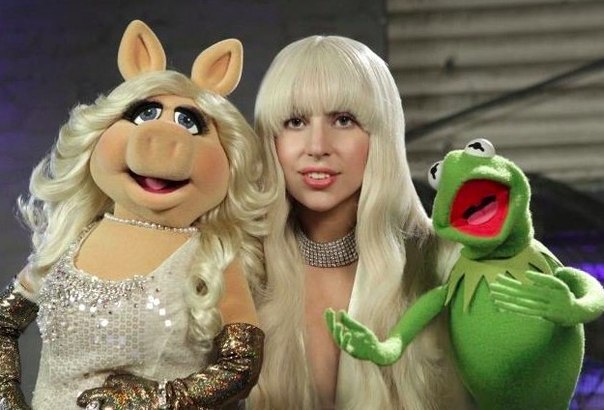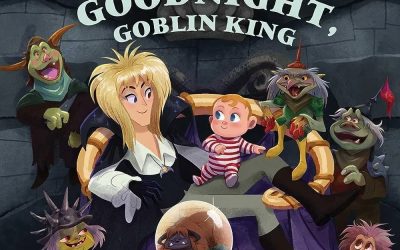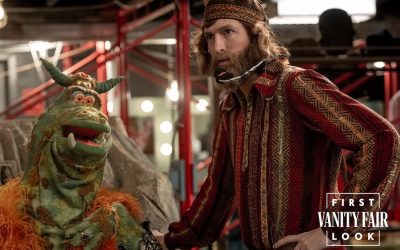 This is the buzz that I heard on Caroll Spinney’s new book, The Wisdom of Big Bird: Caroll wanted to write his autobiography, but his publisher wasn’t sure that a puppeteer’s autobiography would sell. They asked him to turn it into an “inspirational” book full of life lessons, so they could market it to the parents of graduating college students. So we get the subtitle “Lessons from a Life in Feathers,” and a cover illustration of Big Bird at the podium, apparently delivering his commencement address.
This is the buzz that I heard on Caroll Spinney’s new book, The Wisdom of Big Bird: Caroll wanted to write his autobiography, but his publisher wasn’t sure that a puppeteer’s autobiography would sell. They asked him to turn it into an “inspirational” book full of life lessons, so they could market it to the parents of graduating college students. So we get the subtitle “Lessons from a Life in Feathers,” and a cover illustration of Big Bird at the podium, apparently delivering his commencement address.
So all the Muppet fans, of course, we all get a little nervous, cause we’re not really that interested in life lessons. We’ve already learned all our life lessons from incessant viewings of Sesame Street; we’re full up on that.
 What Muppet fans want, really, is what any fan wants — just to get a little closer to the thing we love.
What Muppet fans want, really, is what any fan wants — just to get a little closer to the thing we love.
We want a peek behind the scenes, a chat with the creators, a little insight into why the show we love is the way it is.
So The Wisdom of Big Bird begins with Caroll waking up to go to the studio for a day taping Sesame Street:
For the first twenty-four years, Sesame Street was taped at studios in Manhattan and I would ride my bicycle to work. Then, in 1992, the show moved to the Kaufman Astoria Studios in Queens, and ever since I’ve been driven to and from work in a van. It’s waiting for me at a quarter to eight in front of my building, and as we drive up West End Avenue, I wave to Debi, who hangs out our thirtieth-floor window and waves back.
Some days we stop to pick up Kevin Clash, who plays Elmo. We’ll talk shop — about puppets, or the scripts for the day, or any special projects we’re working on — and the thirty-minute ride goes pretty quickly. Soon we’re across the Fifty-ninth Street Bridge and at the studio door.
 In other words, Muppet fans: You are going to LOVE this book.
In other words, Muppet fans: You are going to LOVE this book.
I mean, is there anybody who read those two paragraphs and didn’t get a little shiver, picturing yourself in the van with Caroll Spinney and Kevin Clash, going across the Fifty-ninth Street Bridge? And that’s page one. The book is full of little details and secrets. Muppet fans just want to be closer, and this book gets you closer.
This is, in fact, a book that’s entirely written for Muppet fans. The college students will like it, but it’s not really an “inspirational” book — in fact, half the time, the “inspirational” chapter titles are treated like a joke. We get advice like “Watch Your Step,” which is just an excuse for Caroll to tell some funny stories about on-set accidents. We also get advice like “Go To China,” which is very meaningful for Caroll, but really only helpful for the rest of us in a metaphorical way.
The one complaint about the book which I’ve heard from my Muppet-fan friends so far is that it’s too short — it clocks in at 153 pages, and you could comfortably read the whole thing on a Sunday morning over a long breakfast. It is short, but the flip side is that there’s no boring parts. We don’t get tragic stories of childhood poverty, battles with substance abuse, mystical revelations that all people are one — or whatever else fills up those huge biographies that people buy and never read. Practically all the stories in the book relate directly to Sesame Street and Caroll’s career with puppets, so it’s just one little gem after another.
 In fact, what we get is really a detailed biography of Big Bird, more than Caroll Spinney. Caroll’s pre-Bird life is taken care of in a chapter and a half. Then we get Caroll meeting Jim Henson, getting hired, and then straight into two chapters on the development of the puppet and the voice. There’s two paragraphs that mention Caroll’s family, and then fourteen pages on why Big Bird looks and sounds the way he does. So, yeah, it’s only 153 pages, but those pages are action-packed for the puppet people.
In fact, what we get is really a detailed biography of Big Bird, more than Caroll Spinney. Caroll’s pre-Bird life is taken care of in a chapter and a half. Then we get Caroll meeting Jim Henson, getting hired, and then straight into two chapters on the development of the puppet and the voice. There’s two paragraphs that mention Caroll’s family, and then fourteen pages on why Big Bird looks and sounds the way he does. So, yeah, it’s only 153 pages, but those pages are action-packed for the puppet people.
It doesn’t just cover Sesame Street, either. A lot of the book follows Big Bird around the world — his appearances on specials and game shows, his trips to China, his tours conducting orchestras, visiting the White House. There are a lot of parts where Caroll is just describing how he got to do some terrifically cool thing, and then what happened when he got there. You would ordinarily think of this as bragging, but Caroll is so visibly excited and grateful for these opportunities that it doesn’t feel that way. He’s not showing off; he’s amazed at what he’s been able to do.
 Caroll wears his heart on his sleeve. He talks openly about the people and the work that he loves. He doesn’t put on a cynical, world-weary distance, claiming that these are just some silly puppets, and who cares. He cares, and he’s thrilled that other people care too. This isn’t the way people usually talk — so sincere and proud — so it feels incredibly intimate, like Caroll is saying all of this right to you. It’s the closest Muppet fans have ever been to a Muppeteer.
Caroll wears his heart on his sleeve. He talks openly about the people and the work that he loves. He doesn’t put on a cynical, world-weary distance, claiming that these are just some silly puppets, and who cares. He cares, and he’s thrilled that other people care too. This isn’t the way people usually talk — so sincere and proud — so it feels incredibly intimate, like Caroll is saying all of this right to you. It’s the closest Muppet fans have ever been to a Muppeteer.
Jim Henson wouldn’t have written a book like this; he was always thinking too much about his new projects to reflect on the past like this. If Frank Oz ever writes his autobiography, it’ll probably focus more on his directing career than his work with the Muppets. The Wisdom of Big Bird is a book by a man who loves being a Muppeteer, who’s always wanted to do this, and who’s grateful that he got the chance. Being Big Bird for thirty-four years and counting is his dream life, so he wants to share it with all of us.
I don’t think there’ll ever be another book like this for us. It joins the very short list — along with The Works and Designs and Doodles — of the essential books that should be on every Muppet fan’s shelf.
by Danny Horn



